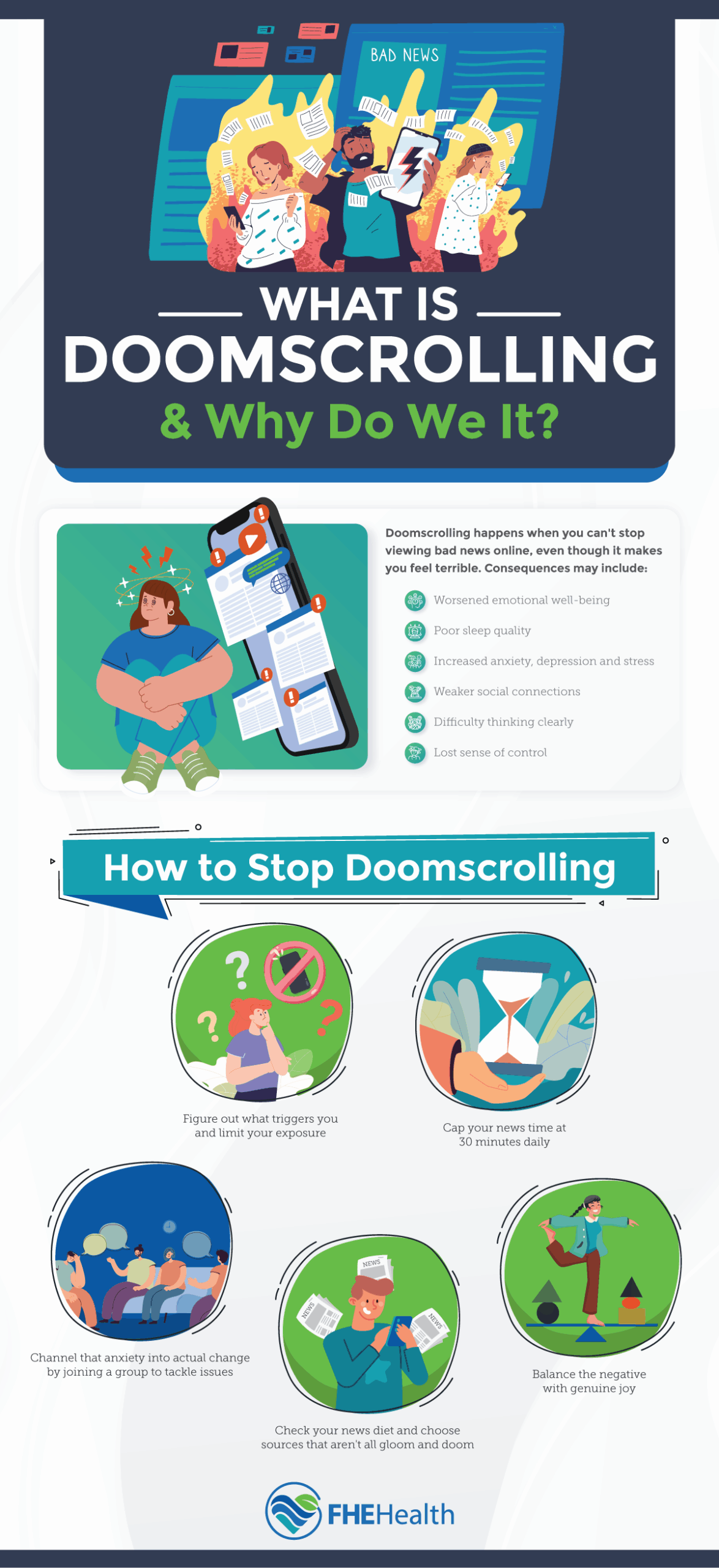
Doomscrolling: It happens to the best of us. While the occasional scroll through social media or news feeds isn’t a problem, it can become an issue if you do it constantly. This behavior can be difficult to quit, even when it starts having a negative impact on mental health. Keep reading to learn more about the meaning of doomscrolling, why it’s so addictive, and how to break the habit once and for all.
What Is Doomscrolling and Why It’s So Addictive
Doomscrolling is the act of compulsively or excessively consuming distressing content or news online, despite it causing negative feelings. It’s a common phenomenon that can have major impacts on mental health. Despite the negative feelings it usually stirs up, many people find the habit hard to break.
Part of why doomscrolling is so addictive is how it affects the brain’s most primitive structures. The limbic system, or “lizard brain” as it’s informally called, holds the key to many survival behaviors. It’s what the innate fight-or-flight reflex in response to threats.
Unfortunately, the limbic system doesn’t always discern the difference between a distressing headline and a stray dog charging at you aggressively. It pays attention to the negative news and even actively looks for it while you scroll. To your limbic system, it’s no different than keeping an eye out for predators. Unfortunately, in this case, the attention to negative content does more harm than good.
Doomscrolling can also activate the brain’s reward system, by releasing dopamine. Even if the news is distressing, the initial dopamine rush can create an addictive habit that encourages the behavior.
Further complicating factors, social media is designed with algorithms to maintain engagement and keep people scrolling. Once you start engaging with a certain type of content, it will provide more to keep you on the website for longer.

The Psychological Impact of Constant Negative News
Part of why doomscrolling can be so harmful to mental health is that people predominantly consume negative news while doing it. Constant exposure to negative stories tends to increase reported levels of anxiety, stress, and depression. According to the Johns Hopkins University of Medicine, exposure to even just 14 minutes of negative news can increase anxiety and depression symptoms. Whether you’re reading about the latest tragedy, an animal going extinct, or depressing news about the economy, you can start worrying about it. Even news stories that leave an uncertainty toward the future can lead to more reported distress.
On top of that, there’s often very little people can do in the face of negative news stories. During the COVID-19 pandemic, many people found themselves facing numerous stressful news articles discussing infection rates, shortages, and other aspects they couldn’t control. The endless barrage of headlines can create a sense of learned helplessness that can further impact mental health.
Consuming negative news content can also create a stress response. Exposure to the event, even indirectly through a news article or clip, can trigger the release of adrenaline and cortisol as viewers experience a fight-or-flight response.
How Doomscrolling Affects Mental Health and Well-Being
Doomscrolling can affect your well-being and mental health far beyond triggering feelings of anxiety or depression. It’s been associated with irritability, poor concentration, and mental fatigue, along with a lack of productivity. These can all wear on your general sense of well-being over time. Beyond that, frequent doomscrolling can impact sleep and trigger stress-related physical symptoms such as stomachaches.
There’s no doubt that doomscrolling can harm mental health, yet many people feel compelled to continue the behavior. The more you fall into this habit, the worse its effects can become and the harder it becomes to step away.
Tips for Breaking a Doomscrolling Habit
You don’t have to let doomscrolling continue controlling your life. It’s true that you can’t realistically escape all negative news, and some news is important to know if it can affect you directly. However, if you’re one of those who find themselves endlessly scrolling through terrible stories across the country or world, breaking this habit can do wonders for your mental health. Consider implementing some of these tips to reduce your overall exposure to negative content:
- Unfollow Accounts That Only Post Negative Content: Some social media accounts only post negative content because it gets results. Negative stories tend to attract a lot of attention, resulting in more views and potentially leading to better monetization opportunities for these account holders. If you notice some accounts on your social media feed only report negative or distressing content, consider unfollowing them. If it’s a close friend or family member who engages in this behavior, you can try hiding their content from your newsfeed so they remain on your friends list without exposing you to the negativity.
- Engage With Positive Media Frequently: Try to engage with positive content more frequently. Because most online algorithms continue to provide you the same content you’ve engaged with in the past, this is a good way to get them to start giving you positive stories more frequently. Try actively seeking out positive content as well to provide some balance on your newsfeed.
- Question Why You’re Scrolling: If you tend to reach for your phone or tablet whenever you’re not actively doing something, make it a point to question why you’re scrolling. Are you bored? Do you actually have something to look up on your computer? If you can’t answer why you’re scrolling or what you hope to get out of it, consider putting the device away and engaging in a hobby instead.
- Avoid Catastrophizing: Remember that what happened in the negative news story you read isn’t likely to happen to you. It’s easy to get caught up in catastrophizing about what you’d do in that situation or how you’d feel, when in reality, your risk of experiencing the same situation is quite low.
- Practice Mindfulness While Scrolling: Pay attention to your general mood while scrolling. If you notice that your mood starts to worsen, stop scrolling and find something positive to do instead.
Creating a Healthy Media Consumption Routine
You don’t have to cut out media altogether to avoid doomscrolling. There’s nothing wrong with a healthy media or social media consumption routine. However, you have to keep some checks and balances in mind while you do. Try incorporating these strategies to keep your scrolling in check:
- Set Daily Time Limits: Try to limit your scrolling time to no more than 30 minutes a day.
- Turn Off Notifications: Disabling your notifications on the apps where you most commonly consume media can remove the temptation to doomscroll.
- Consider Setting Your Device to Grayscale: By turning your phone or other device to the grayscale setting, you can help remove a lot of the impulse to keep scrolling. Apps are designed to be engaging, and they often rely on vibrant colors to catch your eye and keep your attention. Because grayscale is less visually stimulating, your brain doesn’t find it as rewarding.
- Have Dedicated No-Screen Times: Carve out time in your day where devices aren’t welcome. Most importantly, avoid screens the hour before bed. Other common times to avoid mindless scrolling include while you’re eating or using the restroom.
- Keep Your Phone Out of Your Bedroom: It can be tempting to doomscroll while trying to fall asleep at night. However, the light from your phone can make it harder to fall asleep. Try leaving phones out of your bedroom and watch your sleep improve while also reducing the impulse to doomscroll.
- Consider Only Consuming News in Print: If it’s hard to avoid negative stories on your phone, set a boundary to only read the news in print sources. It’s far less convenient to buy and carry around a newspaper than it is to read on a news outlet online, and this can make reading through the news less appealing.
Get the Support You Need to Break Your Doomscrolling Habit
Breaking bad habits can be difficult, but you don’t have to do it alone. At FHE Health, our compassionate counselors have the experience to guide you on your journey to mental wellness. Whether you’re struggling to put your phone down or having difficulties with the side effects of doomscrolling, our team is here to help. Reach out today and take your first step to a better tomorrow.






